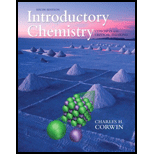
Concept explainers
Interpretation:
The volume of the calcium hydroxide
Concept introduction:
Neutralization reactions are the reactions in which the acid or base is neutralizing another base and acid.
The unknown value of any property can be find out using the stoichiometry from the balanced chemical equation.
Answer to Problem 39E
The volume of
Explanation of Solution
Stoichiometry of the reaction comes in and plays a very important role in doing the calculation of measurable quantities. Stoichiometry is nothing but a comparison of quantities of one species with the other on the basis of a balanced chemical equation. The numerical value placed in from of the compounds tells about the number of moles of that compound reacting or producing in the reaction.
The balanced chemical equation of the reaction that happens between the calcium hydroxide and potassium hydrogen phthalate is shown below.
Molarity is defined as the number of moles of solute per unit volume in liters of solution.
The formula of molarity in terms of volume in milliliters is given below.
It is multiplied by 1000 to convert the volume in milliliters to liters.
The number of moles of any substance is related to its mass by the formula shown below.
Calculate the number of moles of
The molar mass of
The mass of
Substitute the values of m and M in equation (2).
The number of moles of calcium hydroxide
Let us suppose the volume of calcium hydroxide
The molarity of the calcium hydroxide
Substitute the values of molarity and volume in equation (1).
Rearrange to find out the number of moles as shown below.
Compare the moles of both the
One mole of
Therefore, each one mole of
Substitute the values of the number of moles of both species.
Rearrange to calculate the volume as shown below.
The volume of
The volume of
Want to see more full solutions like this?
Chapter 14 Solutions
Introductory Chemistry: Concepts And Critical Thinking, Books A La Carte Edition (8th Edition)
- What volume of 0.250 M HCI is required to neutralize each of the following solutions? a. 25.0 mL of 0.103 M sodium hydroxide, NaOH b. 50.0 mL of 0.00501 M calcium hydroxide, Ca(OH)2 c. 20.0 mL of 0.226 M ammonia, NH3 d. 15.0 mL of 0.0991 M potassium hydroxide, KOHarrow_forwardVitamin C has the formula C6H8O6. Besides being an acid, it is a reducing agent. One method for determining the amount of vitamin C in a sample is to titrate it with a solution of bromine, Br2, an oxidizing agent. C6H8O6(aq) + Br2(aq) 2 HBr(aq) + C6H6O6(aq) A 1.00-g "chewable" vitamin C tablet requires 27.85 ml of 0.102 M Br2 for titration to the equivalence point. What is the mass of vitamin C in the tablet?arrow_forwardIdentify, from each list below, the compound or compounds that will dissolve in water to give a solution that strongly conducts electricity. (a) CuCO3, Cu(OH)2, CuCl2, CuO (b) HCI, H2C2O4, H3PO4, H2SO4arrow_forward
- The exposed electrodes of a light bulb are placed in a solution of H2SO4 in an electrical circuit such that the light bulb is glowing. You add a dilute salt solution, and the bulb dims. Which of the following could be the salt in the solution? a. Ba(NO3)2 b. NaNO3 c. K2SO4 d. Ca(NO3)2 Justify your choices. For those you did not choose, explain why they are incorrect.arrow_forwardConsider separate aqueous solutions of HCl and H2SO4 with the same molar concentrations. You wish to neutralize an aqueous solution of NaOH. For which acid solution would you need to add more volume (in milliliters) to neutralize the base? a. the HCl solution b. the H2SO4 solution c. You need to know the acid concentrations to answer this question. d. You need to know the volume and concentration of the NaOH solution to answer this question. e. c and d Explain.arrow_forward
 Introductory Chemistry: A FoundationChemistryISBN:9781337399425Author:Steven S. Zumdahl, Donald J. DeCostePublisher:Cengage Learning
Introductory Chemistry: A FoundationChemistryISBN:9781337399425Author:Steven S. Zumdahl, Donald J. DeCostePublisher:Cengage Learning Chemistry & Chemical ReactivityChemistryISBN:9781133949640Author:John C. Kotz, Paul M. Treichel, John Townsend, David TreichelPublisher:Cengage Learning
Chemistry & Chemical ReactivityChemistryISBN:9781133949640Author:John C. Kotz, Paul M. Treichel, John Townsend, David TreichelPublisher:Cengage Learning Chemistry & Chemical ReactivityChemistryISBN:9781337399074Author:John C. Kotz, Paul M. Treichel, John Townsend, David TreichelPublisher:Cengage Learning
Chemistry & Chemical ReactivityChemistryISBN:9781337399074Author:John C. Kotz, Paul M. Treichel, John Townsend, David TreichelPublisher:Cengage Learning Chemistry: Principles and PracticeChemistryISBN:9780534420123Author:Daniel L. Reger, Scott R. Goode, David W. Ball, Edward MercerPublisher:Cengage Learning
Chemistry: Principles and PracticeChemistryISBN:9780534420123Author:Daniel L. Reger, Scott R. Goode, David W. Ball, Edward MercerPublisher:Cengage Learning
 Chemistry: An Atoms First ApproachChemistryISBN:9781305079243Author:Steven S. Zumdahl, Susan A. ZumdahlPublisher:Cengage Learning
Chemistry: An Atoms First ApproachChemistryISBN:9781305079243Author:Steven S. Zumdahl, Susan A. ZumdahlPublisher:Cengage Learning





